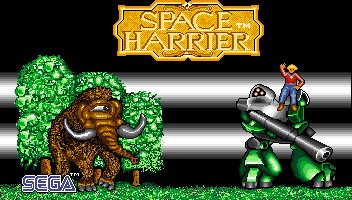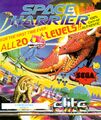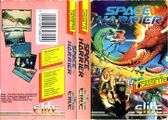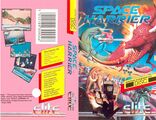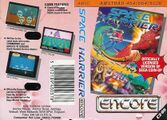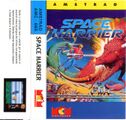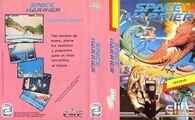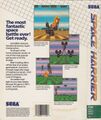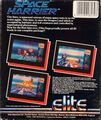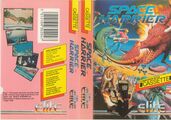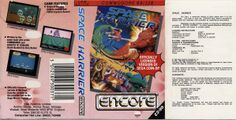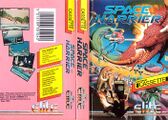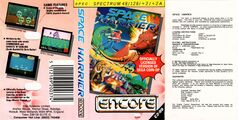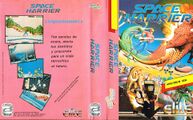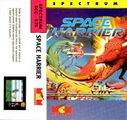Difference between revisions of "Space Harrier (Elite Systems)"
From Sega Retro
| (26 intermediate revisions by 3 users not shown) | |||
| Line 2: | Line 2: | ||
| bobscreen=SpaceHarrier Amiga title.png | | bobscreen=SpaceHarrier Amiga title.png | ||
| title=Space Harrier | | title=Space Harrier | ||
| − | | publisher=[[Elite Systems]], [[Mindscape]] | + | | publisher={{company|[[Elite Systems]]|system=Amiga,CPC,ST,C64,Spectrum|region=UK}} |
| + | {{company|[[Mindscape]]|system=Amiga,ST,C64,IBMPC|region=US}} | ||
| + | {{company|[[MCM Software]]|system=CPC,Spectrum|region=ES}} | ||
| developer= [[Elite Systems]] | | developer= [[Elite Systems]] | ||
| − | | system=Amiga, Amstrad CPC, Atari ST, Commodore 16, Commodore 64, IBM PC, ZX Spectrum | + | | system=[[Amiga]], [[Amstrad CPC]], [[Atari ST]], [[Commodore 16]], [[Commodore 64]], [[IBM PC]], [[ZX Spectrum]] |
| genre=Shoot-'em-Up | | genre=Shoot-'em-Up | ||
| releases={{releasesHC | | releases={{releasesHC | ||
| − | | amiga_date_uk=1988-11{{ | + | | amiga_date_uk=1988-11{{magref|cvg|86|8}} |
| − | | amiga_rrp_uk=19.99{{ | + | | amiga_rrp_uk=19.99{{magref|ace|20|78}}{{magref|gamesmachineuk|17|16}}<!--24.99{{magref|cvg|82|3}}--> |
| amiga_date_us=1989 | | amiga_date_us=1989 | ||
| amiga_rrp_us=49.95{{fileref|CGW US 053.pdf|page=59}} | | amiga_rrp_us=49.95{{fileref|CGW US 053.pdf|page=59}} | ||
| − | | st_date_uk=1988-11{{ | + | | st_date_uk=1988-11{{magref|cvg|86|8}} |
| − | | st_rrp_uk=19.99{{ | + | | st_rrp_uk=19.99{{magref|cvg|82|3}} |
| st_date_us=1989 | | st_date_us=1989 | ||
| st_rrp_us=49.95{{fileref|CGW US 053.pdf|page=59}} | | st_rrp_us=49.95{{fileref|CGW US 053.pdf|page=59}} | ||
| st_code_us=11102 | | st_code_us=11102 | ||
| st_date_fr=198x | | st_date_fr=198x | ||
| − | | st_rrp_fr=250{{ | + | | st_rrp_fr=250{{magref|gen4|2|79}} |
| c64_date_us_d=1987 | | c64_date_us_d=1987 | ||
| c64_rrp_us_d=29.95{{fileref|CGW US 053.pdf|page=59}} | | c64_rrp_us_d=29.95{{fileref|CGW US 053.pdf|page=59}} | ||
| c64_date_uk_c=1986 | | c64_date_uk_c=1986 | ||
| − | | c64_rrp_uk_c=9.95{{ | + | | c64_rrp_uk_c=9.95{{magref|cvg|61|3}} |
| c64_date_uk_d=1986 | | c64_date_uk_d=1986 | ||
| − | | c64_rrp_uk_d=14.95{{ | + | | c64_rrp_uk_d=14.95{{magref|cvg|61|3}} |
| − | | c64_date_uk_1= | + | | c64_date_uk_1=1989-12-22 |
| c64_rrp_uk_1=2.99 | | c64_rrp_uk_1=2.99 | ||
| c64_type_uk_1=Encore (cassette) | | c64_type_uk_1=Encore (cassette) | ||
| c64_date_uk_2=19xx | | c64_date_uk_2=19xx | ||
| c64_type_uk_2=Encore (disk) | | c64_type_uk_2=Encore (disk) | ||
| − | |||
| − | |||
| − | |||
| cpc_date_uk_c=1986 | | cpc_date_uk_c=1986 | ||
| − | | cpc_rrp_uk_c=8.95{{ | + | | cpc_rrp_uk_c=8.95{{magref|cvg|61|3}} |
| cpc_date_uk_d=1986 | | cpc_date_uk_d=1986 | ||
| − | | cpc_rrp_uk_d=14.95{{ | + | | cpc_rrp_uk_d=14.95{{magref|cvg|61|3}} |
| − | | cpc_date_uk_1= | + | | cpc_date_uk_1=1989-12-22 |
| cpc_rrp_uk_1=2.99 | | cpc_rrp_uk_1=2.99 | ||
| cpc_type_uk_1=Encore (cassette) | | cpc_type_uk_1=Encore (cassette) | ||
| Line 49: | Line 48: | ||
| dos_date_uk=1988 | | dos_date_uk=1988 | ||
| − | | spectrum_date_uk_c=1986 | + | | spectrum_date_uk_c=1986-11-24{{magref|ysinclair|13|27}} |
| − | | spectrum_rrp_uk_c=7.95{{ | + | | spectrum_rrp_uk_c=7.95{{magref|cvg|61|3}} |
| − | | spectrum_date_uk_1= | + | | spectrum_date_uk_1=1989-12-22 |
| − | | spectrum_rrp_uk_1=2.99{{ | + | | spectrum_rrp_uk_1=2.99{{magref|crash|74|47}} |
| spectrum_type_uk_1=Encore (cassette) | | spectrum_type_uk_1=Encore (cassette) | ||
| spectrum_date_es_c=19xx | | spectrum_date_es_c=19xx | ||
| Line 58: | Line 57: | ||
}} | }} | ||
}} | }} | ||
| − | The [[Elite Systems]] ports of '''''[[Space Harrier]]''''' (published by [[Mindscape]] in North America) are home computer conversions of the game intended for release in Western markets. They were released for the Amiga, Amstrad CPC, Atari ST, Commodore 64 and ZX Spectrum across 1986, with an IBM PC port released by Mindscape in 1989. | + | The [[Elite Systems]] ports of '''''[[Space Harrier]]''''' (published by [[Mindscape]] in North America) are home computer conversions of the game intended for release in Western markets. They were released for the [[Amiga]], [[Amstrad CPC]], [[Atari ST]], [[Commodore 64]] and [[ZX Spectrum]] across 1986, with an [[IBM PC]] port released by Mindscape in 1989. |
==History== | ==History== | ||
| Line 64: | Line 63: | ||
Elite Systems originally purchased the ''Space Harrier'' license shortly after release, with a view of releasing 8-bit microcomputer versions for the holiday period of 1986. Of these, conversions to the Amstrad CPC and ZX Spectrum arrived on time, alongside a rushed Commodore 64 version. This initial batch of home conversions sold well{{magref|cvg|83|48}}, and the game was named a runner-up in the category of "Game of the Year" at the 1986 Golden Joystick Awards{{magref|cvg|66|101}}. | Elite Systems originally purchased the ''Space Harrier'' license shortly after release, with a view of releasing 8-bit microcomputer versions for the holiday period of 1986. Of these, conversions to the Amstrad CPC and ZX Spectrum arrived on time, alongside a rushed Commodore 64 version. This initial batch of home conversions sold well{{magref|cvg|83|48}}, and the game was named a runner-up in the category of "Game of the Year" at the 1986 Golden Joystick Awards{{magref|cvg|66|101}}. | ||
| − | However, Elite had originally planned to go further by releasing copies for the aging Acorn Electron, BBC Micro (on both cassette and disk) and Commodore 16 computers - start-up instructions are mentioned in the C64, CPC and Spectrum manuals, but no physical copies of the game have been found. The Commodore 16 version was also extensively advertised, having been set to retail for £7.95 in the United Kingdom and L18,000 in Italy. | + | However, Elite had originally planned to go further by releasing copies for the aging Acorn Electron, [[BBC Micro]] (on both cassette and disk) and [[Commodore 16]] computers - start-up instructions are mentioned in the C64, CPC and Spectrum manuals, but no physical copies of the game have been found. The Commodore 16 version was also extensively advertised, having been set to retail for £7.95 in the United Kingdom and L18,000 in Italy. |
| − | Following its success on the 8-bit machines, a 16-bit Atari ST version entered development, being demonstrated in public at the [[Personal Computer World Show 1987]] in September{{magref|cvg|83|48}} and set for release in November of the same year{{magref|gamesmachineuk|2|19}}. The developers struggled with the computer's memory restraints, pushing the release into 1988 to be released in two parts - an initial 10-level version, and a follow-up 10-level "data disk", confusingly called ''Space Harrier II'' (not to be confused with the real ''[[Space Harrier II]]'') in November 1988{{magref|gamesmachine|12|59}}. | + | Following its success on the 8-bit machines, a 16-bit Atari ST version entered development, being demonstrated in public at the [[Personal Computer World Show 1987]] in September{{magref|cvg|83|48}} and set for release in November of the same year{{magref|gamesmachineuk|2|19}}. The developers struggled with the computer's memory restraints, pushing the release into 1988{{magref|pcw|6.52|4}} to be released in two parts - an initial 10-level version, and a follow-up 10-level "data disk", confusingly called ''Space Harrier II'' (not to be confused with the real ''[[Space Harrier II]]'') in November 1988{{magref|gamesmachine|12|59}}. |
In the end, Elite only put out the 10-level version in 1988 (which was said to be "all but completed" in early 1988{{magref|gamesmachine|5|29}} but held back for months), alongside a similarly cut-down Amiga port. It is not thought they ever released their ''Space Harrier II'' game, despite in-game references in ''Space Harrier'' (made all the more awkward on the ST as two disks are required to play the ten levels, the second being titled "data disk"). | In the end, Elite only put out the 10-level version in 1988 (which was said to be "all but completed" in early 1988{{magref|gamesmachine|5|29}} but held back for months), alongside a similarly cut-down Amiga port. It is not thought they ever released their ''Space Harrier II'' game, despite in-game references in ''Space Harrier'' (made all the more awkward on the ST as two disks are required to play the ten levels, the second being titled "data disk"). | ||
| Line 113: | Line 112: | ||
{{gallery | {{gallery | ||
|{{galleryPrintAd | |{{galleryPrintAd | ||
| − | + | |cvg|61|3 | |
| − | + | |cvg|62|15 | |
| − | + | |cvg|63|3 | |
| − | + | |cvg|64|3 | |
|text=Amstrad CPC/Commodore 16/Commodore 64/ZX Spectrum print advert | |text=Amstrad CPC/Commodore 16/Commodore 64/ZX Spectrum print advert | ||
}} | }} | ||
|{{galleryPrintAd | |{{galleryPrintAd | ||
| − | + | |cvg|82|2-3 | |
|text=Amiga/Atari ST print advert | |text=Amiga/Atari ST print advert | ||
| + | }} | ||
| + | |{{galleryPrintAd | ||
| + | |ace|29|17 | ||
| + | |text=Amstrad CPC/Commodore 64/ZX Spectrum Encore re-release print advert | ||
}} | }} | ||
|{{galleryPrintAd | |{{galleryPrintAd | ||
|text=Amiga/Atari ST/IBM PC print advert | |text=Amiga/Atari ST/IBM PC print advert | ||
| − | + | |gen4|21|29 | |
}} | }} | ||
|{{galleryPrintAd | |{{galleryPrintAd | ||
|text=Home computers print advert | |text=Home computers print advert | ||
| − | + | |micromania|23|16 | |
}} | }} | ||
}} | }} | ||
| Line 135: | Line 138: | ||
==Physical scans== | ==Physical scans== | ||
===Amiga version=== | ===Amiga version=== | ||
| − | {{ratings | + | {{ratings|Amiga}} |
| − | | | ||
| − | |||
| − | |||
| − | |||
| − | |||
| − | |||
| − | |||
| − | |||
| − | |||
| − | }} | ||
{{Scanbox | {{Scanbox | ||
| console=Amiga | | console=Amiga | ||
| Line 165: | Line 158: | ||
===Amstrad CPC version=== | ===Amstrad CPC version=== | ||
| − | {{ratings | + | {{ratings|CPC}} |
| − | | | ||
| − | |||
| − | |||
| − | |||
| − | |||
| − | |||
| − | |||
| − | }} | ||
{{Scanbox | {{Scanbox | ||
| console=Amstrad CPC | | console=Amstrad CPC | ||
| Line 204: | Line 189: | ||
===Atari ST version=== | ===Atari ST version=== | ||
| − | {{ratings | + | {{ratings|ST}} |
| − | | | ||
| − | |||
| − | |||
| − | |||
| − | |||
| − | |||
| − | |||
| − | |||
| − | |||
| − | }} | ||
{{Scanbox | {{Scanbox | ||
| console=Atari ST | | console=Atari ST | ||
| Line 238: | Line 213: | ||
===Commodore 64 version=== | ===Commodore 64 version=== | ||
| − | {{ratings | + | {{ratings|C64}} |
| − | | | ||
| − | |||
| − | |||
| − | |||
| − | |||
| − | }} | ||
{{Scanbox | {{Scanbox | ||
| console=Commodore 64 | | console=Commodore 64 | ||
| Line 263: | Line 232: | ||
}}{{Scanbox | }}{{Scanbox | ||
| console=Commodore 64 | | console=Commodore 64 | ||
| − | | region=UK | + | | region=UK (cassette) (Encore) |
| cover=SpaceHarrier C64 EU Box Cassette Encore.jpg | | cover=SpaceHarrier C64 EU Box Cassette Encore.jpg | ||
| − | | cassette= | + | | inlay=SpaceHarrier C64 UK Inlay Encore.jpg |
| + | | cassette=SpaceHarrier C64 UK Cassette Encore.jpg | ||
}}{{Scanbox | }}{{Scanbox | ||
| console=Commodore 64 | | console=Commodore 64 | ||
| − | | region=UK | + | | region=UK (disk) (Encore) |
| cover=SpaceHarrier C64 EU Box Disk Encore.jpg | | cover=SpaceHarrier C64 EU Box Disk Encore.jpg | ||
| disk= | | disk= | ||
| Line 274: | Line 244: | ||
}} | }} | ||
| − | === | + | ===IBM PC version=== |
| + | {{ratings|IBMPC}} | ||
{{Scanbox | {{Scanbox | ||
| − | | console= | + | | console=IBM PC |
| region=US (5¼-inch) | | region=US (5¼-inch) | ||
| cover= | | cover= | ||
}}{{Scanbox | }}{{Scanbox | ||
| − | | console= | + | | console=IBM PC |
| region=US (3½-inch) | | region=US (3½-inch) | ||
| front=SpaceHarrier DOS US Box Front 35inch.jpg | | front=SpaceHarrier DOS US Box Front 35inch.jpg | ||
| Line 286: | Line 257: | ||
| spinemissing=yes | | spinemissing=yes | ||
}}{{Scanbox | }}{{Scanbox | ||
| − | | console= | + | | console=IBM PC |
| region=UK | | region=UK | ||
| front | | front | ||
| Line 292: | Line 263: | ||
===ZX Spectrum version=== | ===ZX Spectrum version=== | ||
| − | {{ratings | + | {{ratings|Spectrum}} |
| − | | | ||
| − | |||
| − | |||
| − | |||
| − | |||
| − | |||
| − | |||
| − | |||
| − | |||
| − | |||
| − | |||
| − | |||
| − | |||
| − | |||
| − | |||
| − | }} | ||
{{Scanbox | {{Scanbox | ||
| console=ZX Spectrum | | console=ZX Spectrum | ||
Latest revision as of 18:52, 20 March 2024
| Space Harrier | |||||||||||||||||||||||||||||||||||||||||||||||||||||||||||||||||||||||||||||||||||||||||||||||||||||||||
|---|---|---|---|---|---|---|---|---|---|---|---|---|---|---|---|---|---|---|---|---|---|---|---|---|---|---|---|---|---|---|---|---|---|---|---|---|---|---|---|---|---|---|---|---|---|---|---|---|---|---|---|---|---|---|---|---|---|---|---|---|---|---|---|---|---|---|---|---|---|---|---|---|---|---|---|---|---|---|---|---|---|---|---|---|---|---|---|---|---|---|---|---|---|---|---|---|---|---|---|---|---|---|---|---|---|
| System(s): Amiga, Amstrad CPC, Atari ST, Commodore 16, Commodore 64, IBM PC, ZX Spectrum | |||||||||||||||||||||||||||||||||||||||||||||||||||||||||||||||||||||||||||||||||||||||||||||||||||||||||
| Publisher: Elite Systems (UK) Mindscape (US) MCM Software (ES) | |||||||||||||||||||||||||||||||||||||||||||||||||||||||||||||||||||||||||||||||||||||||||||||||||||||||||
| Developer: Elite Systems | |||||||||||||||||||||||||||||||||||||||||||||||||||||||||||||||||||||||||||||||||||||||||||||||||||||||||
| Genre: Shoot-'em-Up | |||||||||||||||||||||||||||||||||||||||||||||||||||||||||||||||||||||||||||||||||||||||||||||||||||||||||
|
The Elite Systems ports of Space Harrier (published by Mindscape in North America) are home computer conversions of the game intended for release in Western markets. They were released for the Amiga, Amstrad CPC, Atari ST, Commodore 64 and ZX Spectrum across 1986, with an IBM PC port released by Mindscape in 1989.
Contents
History
Development
Elite Systems originally purchased the Space Harrier license shortly after release, with a view of releasing 8-bit microcomputer versions for the holiday period of 1986. Of these, conversions to the Amstrad CPC and ZX Spectrum arrived on time, alongside a rushed Commodore 64 version. This initial batch of home conversions sold well[10], and the game was named a runner-up in the category of "Game of the Year" at the 1986 Golden Joystick Awards[11].
However, Elite had originally planned to go further by releasing copies for the aging Acorn Electron, BBC Micro (on both cassette and disk) and Commodore 16 computers - start-up instructions are mentioned in the C64, CPC and Spectrum manuals, but no physical copies of the game have been found. The Commodore 16 version was also extensively advertised, having been set to retail for £7.95 in the United Kingdom and L18,000 in Italy.
Following its success on the 8-bit machines, a 16-bit Atari ST version entered development, being demonstrated in public at the Personal Computer World Show 1987 in September[10] and set for release in November of the same year[12]. The developers struggled with the computer's memory restraints, pushing the release into 1988[13] to be released in two parts - an initial 10-level version, and a follow-up 10-level "data disk", confusingly called Space Harrier II (not to be confused with the real Space Harrier II) in November 1988[14].
In the end, Elite only put out the 10-level version in 1988 (which was said to be "all but completed" in early 1988[15] but held back for months), alongside a similarly cut-down Amiga port. It is not thought they ever released their Space Harrier II game, despite in-game references in Space Harrier (made all the more awkward on the ST as two disks are required to play the ten levels, the second being titled "data disk").
Space Harrier II would have been playable on its own[16], presumably starting on level 11. It was priced at £19.99 for the Amiga and ST[17].
The full, 20-level version for both platforms did not emerge until 1990, after which it became the de facto edition of the game for future compilations. The 20-level version is sometimes referred to as Space Harrier: Return to the Fantasy Zone or Space Harrier Plus by users, however it is not thought it was known as anything other than Space Harrier officially.
Versions
Despite later claims that the Amiga and Atari ST ports are "100% authentic", none of the Elite ports of Space Harrier include the bonus stages from the arcade, just the regular levels.
Amiga version
The Amiga version of the game is mouse-only, complete with added auto-fire if the player holds down the mouse button. For reasons unknown, the "GET READY" sample has been re-recorded
Amstrad CPC version
On the Amstrad, Space Harrier uses "vector" graphics both for the sake of speed, and to avoid graphical overlap problems seen in other versions of the game. This version does not allow the player to shoot and destroy scenery such as trees. By the time the game reaches level five, it begins to deviate from the arcade original, failing to include some of the correct enemies and simplifying much of the scenery.
Atari ST version
Like the Amiga version, the ST version can only be played with the mouse, though this time suffers from noticeable slowdown whenever too many objects are on-screen. This is particularly apparent when a boss appears (likely peaking on stage 3's boss). The game also takes a considerable time to load - the player is forced to wait in limbo after a boss while the next level is loaded off the disk.
Unlike the arcade game, no stages have "ceilings". The game also runs in a smaller window than the Amiga version, with an added border on the right hand side.
Commodore 64 version
Elite rushed the Commodore 64 version to market in the UK against the wishes of programmer xxxx, leading to a product that, while fully playable, shows noticable signs of being unfinished. Improvements to the game were, however, put in place in time for launch in the US, with improved graphics and added floor animations missing in the UK version. Levels three and four of the UK version are swapped, and only six different levels exist in total.
ZX Spectrum version
While the Spectrum port is able to render the checkerboard flooring in full (unlike the CPC and Commodore 64 versions), there is no in-game music, and a lack of colours makes the game more difficult to see. Only a 48k version of the game was ever made - were an 128k version to exist, music would have likely been an option.
Production credits
Amiga version
- Program: Richard Frankish
- Graphics: M Sportouch
- Music: Jas C Brooke
- Copyright 1989 Elite Systems Ltd
Magazine articles
- Main article: Space Harrier (Elite Systems)/Magazine articles.
Promotional material
also published in:
- Computer & Video Games (UK) #62: "December 1986" (1986-11-xx)[18]
- Computer & Video Games (UK) #63: "January 1987" (1986-12-16)[19]
- Computer & Video Games (UK) #64: "February 1987" (1987-01-xx)[20]
Physical scans
Amiga version
| Sega Retro Average | |||||||||||||||||||||||||||||||||||||||
|---|---|---|---|---|---|---|---|---|---|---|---|---|---|---|---|---|---|---|---|---|---|---|---|---|---|---|---|---|---|---|---|---|---|---|---|---|---|---|---|
|
| 81 | |
|---|---|
| Based on 7 reviews | |
Amstrad CPC version
| Sega Retro Average | |||||||||||||||||||
|---|---|---|---|---|---|---|---|---|---|---|---|---|---|---|---|---|---|---|---|
|
| 79 | |
|---|---|
| Based on 3 reviews | |
Atari ST version
| Sega Retro Average | ||||||||||||||||||||||||||||||||||
|---|---|---|---|---|---|---|---|---|---|---|---|---|---|---|---|---|---|---|---|---|---|---|---|---|---|---|---|---|---|---|---|---|---|---|
|
| 78 | |
|---|---|
| Based on 6 reviews | |
Commodore 64 version
| Sega Retro Average | |||||||||||||||||||
|---|---|---|---|---|---|---|---|---|---|---|---|---|---|---|---|---|---|---|---|
|
| 45 | |
|---|---|
| Based on 3 reviews | |
IBM PC version
| Sega Retro Average | |||||||||
|---|---|---|---|---|---|---|---|---|---|
|
| 18 | |
|---|---|
| Based on 1 review | |
| IBM PC, US (5¼-inch) |
|---|
|
| IBM PC, UK |
|---|
|
ZX Spectrum version
| Sega Retro Average | |||||||||||||||||||||||||||||||||||||||
|---|---|---|---|---|---|---|---|---|---|---|---|---|---|---|---|---|---|---|---|---|---|---|---|---|---|---|---|---|---|---|---|---|---|---|---|---|---|---|---|
|
| 78 | |
|---|---|
| Based on 7 reviews | |
References
- ↑ 1.0 1.1 Computer & Video Games, "December 1988" (UK; 1988-11-xx), page 8
- ↑ 2.0 2.1 ACE, "May 1989" (UK; 1989-04-06), page 78
- ↑ The Games Machine, "April 1989" (UK; 1989-03-23), page 16
- ↑ 4.0 4.1 4.2 File:CGW US 053.pdf, page 59
- ↑ Computer & Video Games, "August 1988" (UK; 1988-07-15), page 3
- ↑ Génération 4, "Janvier/Février 1988" (FR; 198x-xx-xx), page 79
- ↑ 7.0 7.1 7.2 7.3 7.4 Computer & Video Games, "November 1986" (UK; 1986-10-15), page 3
- ↑ Your Sinclair, "January 1987" (UK; 198x-xx-xx), page 27
- ↑ 9.0 9.1 Crash, "March 1990" (UK; 1990-02-22), page 47
- ↑ 10.0 10.1 10.2 Computer & Video Games, "September 1988" (UK; 1988-08-16), page 48
- ↑ Computer & Video Games, "April 1987" (UK; 1987-03-xx), page 101
- ↑ The Games Machine, "December/January 1987/1988" (UK; 1987-11-19), page 19
- ↑ Popular Computing Weekly, "Vol. 6 No. 52" (UK; 1987-12-31), page 4
- ↑ Popular Computing Weekly, "Vol. 6 No. 52" (UK; 1987-12-31), page 59
- ↑ Popular Computing Weekly, "Vol. 6 No. 52" (UK; 1987-12-31), page 29
- ↑ The Games Machine, "October 1988" (UK; 1988-09-15), page 36
- ↑ 17.0 17.1 The Games Machine, "April 1989" (UK; 1989-03-23), page 25
- ↑ Computer & Video Games, "December 1986" (UK; 1986-11-xx), page 15
- ↑ Computer & Video Games, "January 1987" (UK; 1986-12-16), page 3
- ↑ Computer & Video Games, "February 1987" (UK; 1987-01-xx), page 3
- ↑ Amiga Joker, "April '90" (DE; 1990-03-30), page 42
- ↑ Computer & Video Games, "April 1989" (UK; 1989-03-16), page 55
- ↑ New Computer Express, "March 4, 1989" (UK; 1989-03-02), page 48
- ↑ Svet Igara, "Jun 1989" (YU; 1989-xx-xx), page 49
- ↑ Zzap!64, "April 1989" (UK; 1989-03-16), page 22
- ↑ 26.0 26.1 Computer & Video Games, "January 1987" (UK; 1986-12-16), page 14
- ↑ 27.0 27.1 27.2 Computer & Video Games, "March 1990" (UK; 1990-02-16), page 64
- ↑ Joystick, "Février 1990" (FR; 1990-xx-xx), page 127
- ↑ ACE, "December 1988" (UK; 1988-xx-xx), page 44
- ↑ The Games Machine, "November 1988" (UK; 1988-10-20), page 59
- ↑ Génération 4, "Septembre/Octobre 1988" (FR; 1988-0x-xx), page 67
- ↑ ST Action, "October 1988" (UK; 1988-xx-xx), page 46
- ↑ Tilt, "Julliet/Août 1988" (FR; 1988-0x-xx), page 37
- ↑ Commodore Force, "August 1993" (UK; 1993-06-24), page 21
- ↑ Zzap!64, "March 1990" (UK; 1990-xx-xx), page 56
- ↑ Aktueller Software Markt, "Mai 1990" (DE; 1990-04-30), page 18
- ↑ Crash, "Christmas Special 1986/1987" (UK; 1986-12-10), page 28
- ↑ Sinclair User, "December 1986" (UK; 1986-11-18), page 36
- ↑ Your Sinclair, "March 1987" (UK; 1987-xx-xx), page 32
- ↑ Your Sinclair, "March 1990" (UK; 1990-02-18), page 43
| Space Harrier (Elite Systems) | |
|---|---|
|
Main page | Comparisons | Hidden content | Magazine articles | Reception | |
| Space Harrier series |
|---|
| Space Harrier (JP home computers | Elite versions | Sega Ages Vol. 2 | mobile | 3D) (1986) | Space Harrier 3D (1988) | Space Harrier II (Electronic) (1988) | Planet Harriers (2001) | Typing Space Harrier (2002) | Sega Ages 2500 Series Vol. 4: Space Harrier (2003) |
| Albums |
| Yu Suzuki Produce Hang On/Space Harrier (1997) | Planet Harriers The Original Soundtrack (2001) | Space Harrier II: Space Harrier Complete Collection Original Soundtrack (2005) |
| Other Media |
| Space Harrier (video) (1987) | Space Harrier: White Dragon no Yuusha (1988) |
- No players field
- US Amiga games
- All US games
- UK Amiga games
- All UK games
- Amiga games
- All shoot-'em-up games
- 1988 Amiga games
- All 1988 games
- US Atari ST games
- FR Atari ST games
- All FR games
- UK Atari ST games
- Atari ST games
- 1988 Atari ST games
- ES Amstrad CPC games
- All ES games
- UK Amstrad CPC games
- Amstrad CPC games
- 1986 Amstrad CPC games
- All 1986 games
- US Commodore 64 games
- UK Commodore 64 games
- Commodore 64 games
- 1986 Commodore 64 games
- ES ZX Spectrum games
- UK ZX Spectrum games
- ZX Spectrum games
- 1986 ZX Spectrum games
- US IBM PC games
- UK IBM PC games
- IBM PC games
- 1986 IBM PC games
- All games
- Credits without source
- Credits without reference
- Space Harrier (Elite Systems)
- Space Harrier (franchise)
